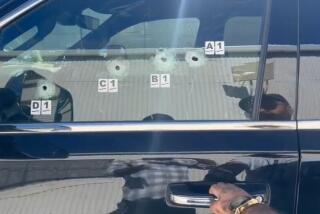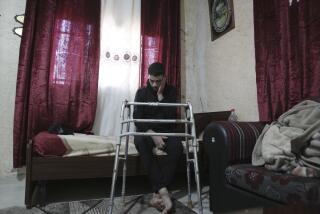Kashmiris Say Indian Forces Commit Abuse
- Share via
HAIGAM, India — Not long before he died at the hands of Indian security forces, Jalil Ahmad Shah donated blood for earthquake victims clear across the country he wanted to leave.
Just 12 days later, the 28-year-old district secretary of the Jammu and Kashmir Liberation Front, a legal pro-independence party, was dead. There was at least one bullet wound in the right side of his head, and his broken arms were crisscrossed with rope marks, according to his brother, Bilal Ahmad Shah, 22.
No autopsy was performed on Shah’s body, but his brother examined the corpse as best he could in the van that carried it home. There were bruises all over the body and bits of cotton bandage stuffed in several holes that appeared to be bullet wounds, his brother said.
“I didn’t count them,” he added. “I couldn’t stand it.”
The independence struggle that Jalil Shah supported in this disputed Himalayan state is at the heart of the conflict between India and Pakistan, which the two countries’ leaders hope they can at least begin to resolve at a peace summit Sunday.
The allegations of torture and murder in Shah’s case are far too unpleasant for the kind of conversation Indian Prime Minister Atal Behari Vajpayee and Pakistani military ruler Gen. Pervez Musharraf hope to have near the Taj Mahal.
But in Kashmir, where Indian security forces are fighting to crush a 12-year insurgency by Muslim rebels, people ask how anyone can try to make peace without confronting allegations that India’s security forces are committing serious human rights abuses.
“They are killing the people mercilessly,” charged Syed Ali Shah Geelani, a separatist Kashmiri leader with close ties to radical guerrillas battling Indian rule. “They are gang-raping our womenfolk. They are arresting our young people without justification.”
India’s government insists that it does not condone human rights abuses and accuses the guerrillas, who it says are armed and trained by neighboring Pakistan, of carrying out terrorism.
But Kashmiris say that deaths in custody are common.
Shah was one of 77 party members who answered the call for blood donors Feb. 1, six days after a massive earthquake struck Gujarat state, killing 15,537 people and injuring about 50,000. The Jammu and Kashmir Liberation Front ended its armed struggle in 1994 and has been allowed to operate legally for just over a year.
The donors’ act of kindness was recorded on certificates the size of business cards that were filed away in the Hameed Blood Bank in Srinagar, the summer capital of Jammu and Kashmir state, the Indian-controlled portion of the disputed region. A clerk listed Shah in a thin ledger as donor No. 29.
Nearly two weeks later, Shah’s family says, at least 50 Indian soldiers and police, including troops from the notorious Rashtrya Rifles, came to their house about 11 p.m.
The Indian forces ordered Shah’s mother, Rafiqa, not to light candles or leave the house, said Shah’s sister, Nusrat Kabir Shah, 20.
“They told us my brother was arrested,” the sister recalled in an interview Monday. “We begged them: ‘Please release him. Whatever money you need, we’ll give you. Just release him.’ ”
The troops left after about 15 minutes, but it took two days of searching and demands for answers before Shah’s relatives confirmed what they had feared: Shah was dead, and his body was at a nearby Indian army camp.
The army said Shah was a separatist guerrilla killed in a gun battle. His family, friends and Kashmiri human rights activists believe that he was killed in custody.
Shah’s death is just one of a few thousand unsolved killings and disappearances in Jammu and Kashmir.
Though Vajpayee is willing to discuss Kashmir, his government insists that the whole region--including the approximately one-third under Pakistani control--is part of India. His officials say he wants to talk more about trade and other issues when he meets Musharraf for about four hours Sunday in Agra.
Kashmiri human rights activists have documented about 3,000 disappearances in recent years, said Geelani, the separatist leader, who has spent a total of 11 years in Indian jails since 1962 for insisting that Kashmir must have its independence.
Geelani, 71, was released last year from Jodhpur Central Jail after serving a seven-month term. Under the sweeping authority of India’s Public Safety Act, Geelani was sent to prison without trial on the order of a district magistrate. These local administrative officials have the authority to jail a person for up to two years if he or she is considered a threat to security.
Geelani said a friend, Ghulam Abbas, who was in his 30s, was found dead Dec. 12 near the western Kashmir village of Mandher.
“He was arrested and taken to the jungle near his village and mercilessly killed,” Geelani said. A letter was attached to his chest saying that he was killed by moujahedeen, or Muslim holy warriors. “This cannot be the action of the moujahedeen. It was the action of the army, which blamed the moujahedeen.”
Kashmir’s Muslim guerrillas also have killed many civilians, although solid estimates are difficult to come by. One of their victims was Shah’s father, Abdul Kabir Shah, 40, who was shot April 8, 1994, as he went to pray at a village mosque, said Nusrat Shah, the daughter.
After the elder Shah’s death, the job of supporting a family of eight fell to Jalil, who ran a shop that sold traditional natural remedies. Now he too is dead.
But more had to die before his family could give the younger Shah his final rites. When the police came to inform them Feb. 15 that his body was in the army camp, three officers accompanied the family to help retrieve his body, Nusrat said.
At the camp, soldiers told them to go look at the hospital in the town of Baramullah, she said. After waiting there for three hours, and still not finding the young man’s body, the family joined about 700 people in an angry march that blocked the main highway to Srinagar.
A truckload of about 30 soldiers arrived and ordered the marchers to disperse, she said.
“We refused and said, ‘Hand over the body,’ ” Nusrat said. “I begged them, ‘Don’t fire,’ ” she added, flattening both hands together.
But a captain ordered his troops to open fire, and they shot into the crowd, she said. Four people were killed and 24 injured, including Nusrat, who has a lump and a thick white scar on her forehead where a bullet grazed her.
Lt. Gen. J.R. Mukherjee of the Indian army promised at a Feb. 18 news conference that the incident would be investigated and that any of his men “found blameworthy” would be charged. But he also said his soldiers had come under attack with stones.
“The convoy commander, in self-defense, ordered five of his men to open controlled fire in the air,” Mukherjee told reporters. “There are also reports of some elements firing at the convoy.”
In a rare move, the state government appointed High Court Justice Omar Prakash Sharma to head an inquiry into the killings. He is still waiting for the army to answer questions in a session that was supposed to have begun July 2.
“The person who has fired, or directed firing, has not been named,” the judge said in an interview. “The army is not disclosing his name.”
The army asked for a month’s extension on testifying to consult with the minister of defense, Sharma said. If the army hasn’t responded by July 25, its officials will be summoned to appear at the inquiry, the judge added.
The state also gave Sharma an extension until Oct. 18 to complete an investigation that was supposed to take two months. It was slow to start because the government only recently provided essential staff, such as a stenographer and secretary, the judge said.
“It wasn’t done intentionally,” he said. “Just bureaucratic delays.”
More to Read
Sign up for Essential California
The most important California stories and recommendations in your inbox every morning.
You may occasionally receive promotional content from the Los Angeles Times.









